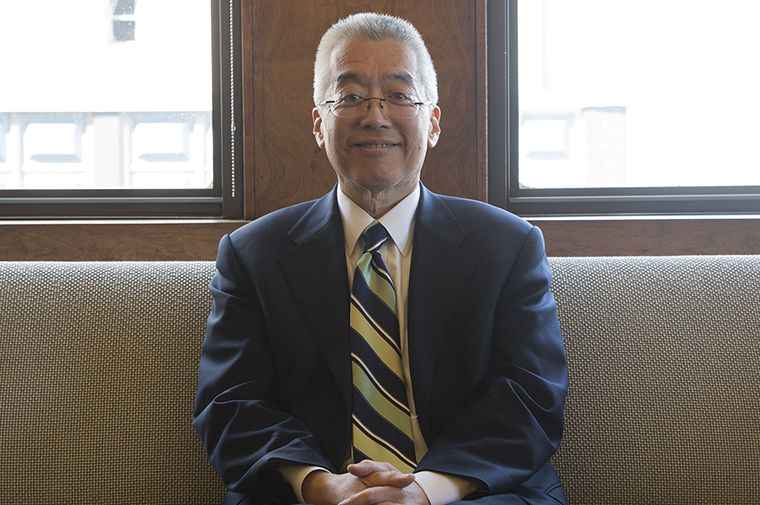Kim advises incoming students on first-year success
President and CEO Kwang-Wu Kim was appointed to his role as Columbia’s 10th president on Feb. 26, 2013.
June 18, 2015
While incoming students get acclimated to their new surroundings at Columbia, they will also learn who the college’s higher-ups are and how certain individuals will impact their academic experience.
During the Fall 2015 Semester, President and CEO Kwang-Wu Kim will be one of many people working behind the scenes to make new students’ introduction to campus as smooth as possible.
The Chronicle spoke with Kim about the freshman year experience, his advice to commuter students and what new students need to understand about the college’s Strategic Plan.
THE CHRONICLE: What should new students know about you as their president?
KWANG-WU KIM: I came to Columbia College Chicago because of the students. I feel like at some level I understand who our students are because—it may not look to our students like it’s true—but I feel like some aspect of who they are and what they’re trying to accomplish in their lives is part of who I am, too. I want students to know what I’m constantly thinking about is “What does the education have to look like to be truly valuable for our students?” That’s what drives me.
What are your tips for a successful freshman year?
It all comes down to being willing to engage with lots of people. I really think the key as a new student is—in whatever way fits your own personality—to always be sort of stepping forward, to be asking the question, to be meeting someone new…to have that feeling when you see there’s a door and you’re not sure [what’s behind it], so you just open it. I felt like as an undergrad, I didn’t do that enough. I think about this a lot even though that was a long time ago. I imagine that if I were to go back to my undergrad situation, I would have been much more that way, because there’s nothing to lose, right? You may come here thinking you know exactly what you want to study, but it’s really important to stretch yourself and try some things. You may discover there’s something else that’s actually much more compelling to you than what you thought you wanted to do, and you only get there by experimenting.
Do you have any advice for commuter students trying to get involved on campus?
For our commuters, the key to involvement is to build it into your schedule. If you live on campus, it can be a little bit more spontaneous. I use my own calendar as an example. A lot of times people ask, “What does the president do all day?” and a lot of my work is actually sitting in meetings with people. If I didn’t think about it carefully, literally, I would be in meetings with people all day, every day. I have to write; I have to think, so I block out a little bit of time in my schedule to do that kind of work. Otherwise, what will happen is it’ll get pushed to the end of the day when I go home. Similar probably for a commuter, think about blocking out a little time in your calendar for finding more ways to get involved with Columbia. I think that will really enhance the experience.
What are you most looking forward to this academic year?
In year one, my primary focus was learning the place as well as I could, but also there were a lot of changes I needed to make in the leadership at the college, so I was very focused on that. This past year was all about leading the development of the Strategic Plan. Those two things [are] never done, but most of the fundamental pieces are in place. What I’m really excited about now is helping to guide some of the work to make certain pieces of the plan come alive. [This year] has a lot to do with the parts of the plan that are about connecting to the larger world, but also in-house examining the educational experience for our students and figuring out what we need to do to improve it. One other thing I’d say is this fall we’ll be really moving forward with the conversation about developing a new student center. I’m very excited about that.
What should new students know about the college’s Strategic Plan?
It means they’ve come to a school that’s thinking about the present but also thinking about the future. [We are] asking the question, “What are all the things that we need to keep improving so that the education keeps getting better and better?” I hope that’s exciting because I don’t think students should have to worry about it too much. We want our students focused on their experience while in the background we’re just constantly trying to make it better. They’re not coming to a school that just accepts, “All we have to do is just keep repeating the same thing over and over again.” I think that would be the opposite of a school that has a strategic plan.








